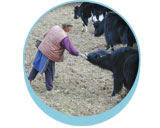 |
Satellite Workshop 7 Mobility, Flexibility, and Potential of Nomadic Pastoralism in Eurasia and Africa |
|
| Program and Abstracts >> |
Poster >> |
|
This Satellite Workshop will examine how pastoralists of various ecological, historical, political, and economic backgrounds have responded to modernization and globalization, and will discuss the potential and future of nomadic pastoralism in Eurasia and Africa.
Both ecological and anthropological researchers have considered nomadic pastoralism a rational production system, owing to its high adaptability to environmental changes. The principal factors that enable pastoralists to adapt to change are “mobility” and “flexibility.” The high mobility of humans and livestock supports a sustainable use of natural resources, and the flexibility illustrated in organizing social and political institutions and practicing pastoral production enhances efficient management of subsistence activities.
However, with the expansion of modernization and globalization, the trend of national governments and development organizations has been to treat "mobility" and "flexibility" as complicating factors, and to eliminate them from the policy-making process. For example, the growth of nationalism and the establishment of new national borders have restricted the movements of pastoralists and limited inter-ethnic communications. In some countries, socialist regimes have collectivized pastoralists and their livestock into animal husbandry cooperatives. Recent international development projects have also strongly triggered the sedentarization of pastoralists and privatization of rangeland and water resources.
This workshop has two presentation sessions and a panel discussion. In the first session, we will focus on how pastoralists manage their livestock, rangeland, and water resources under the influences of sedentarization, privatization, and commercialization. In the second session, we will examine the process of redefining ethnic identities and reorganizing social relations under national and global changes. Finally, in the panel discussion, both speakers and panelists will join together to comprehensively discuss how “mobility” and “flexibility” can be a positive power with regard to maintaining pastoral subsistence and reorganizing societies in response to modernization and globalization.
| >>Satellite Workshop 7: Program and Abstracts | ||
| 10:00-10:05 | Welcoming Address OHTA Itaru (ASAFAS, Kyoto University) |
|
| 10:05-10:15 | Opening Remarks NAITO Naoki (ASAFAS, Kyoto University) |
|
| Session1: Sedentarization, Commercialization, and Pastoralists' Management of theirLivestock and Natural Resources Moderator: NAITO Naoki |
||
| 10:15-10:45 | Climate, Economy, and Land Policy: Effects on Pastoral Mobility Patterns in Mongolia Maria E. Fernandez-Gimenez (Colorado State University), B. Batbuyan (Mongolian Academy of Sciences) and J. Oyungerel (Mongolian Academy of Sciences) |
|
| 10:45-11:15 | Pastoralists’ Potential and Challenge to Development: A Case Study of the Rendille in Northern Kenya SUN Xiaogang (ASAFAS, Kyoto University) |
|
| 11:15-11:30 | Coffee Break | |
| 11:30-12:00 | Management and Evaluation of Livestock under Socialist Collectivization in Mongolia KAZATO Mari (ASAFAS, Kyoto University) |
|
| 12:00-12:30 | Pastoralism within the Household Economy: A Case of Sheep Herders in East Nepal WATANABE Kazuyuki (Ritsumeikan University) |
|
| 12:30-14:00 | Lunch | |
| Session2: Redefining Ethnic Identities and Reorganizing Social Relations of Pastoral Societies under National and Global Changes Moderator: NAKAMURA Kyoko (ASAFAS, Kyoto University) |
||
| 14:00-14:30 | Ethnicity and Migration among the Ariaal, Kenya Martin Falkenstein (Germany) |
|
| 14:30-15:00 | Transformation of the Age System of the Borana-Oromo People of Southern Ethiopia: Social Changes of a Pastoral Society with its Incorporation into a Modern State TAGAWA Gen (Hiroshima City University) |
|
| 15:00-15:15 | Coffee Break | |
| 15:15-15:45 | Newly Emerged Independent Herders and the Horse Trust System among Sakha Agro-Pastoralists in Siberia: Socio-Economic Conditions in the Post-Socialist Era TAKAKURA Hiroki (Tohoku University) |
|
| 15:45-16:15 | Spatial-Temporal Discourses in Samburu, Northern Kenya: Manifest Destiny, Quantum Development and the Economy of Appearances Jon Holtzman (Western Michigan University) |
|
| 16:15-16:30 | Coffee Break | |
| 16:30-16:50 | Comments KAMIMURA Akira (Tokyo University of Foreign Studies) SOGA Toru (Hirosaki University) |
|
| 16:50-17:50 | General Discussion: Mobility, Flexibility, and Potential of Pastoralism Chair: OHTA Itaru |
|
| 17:50-18:00 | Closing Remarks |
|